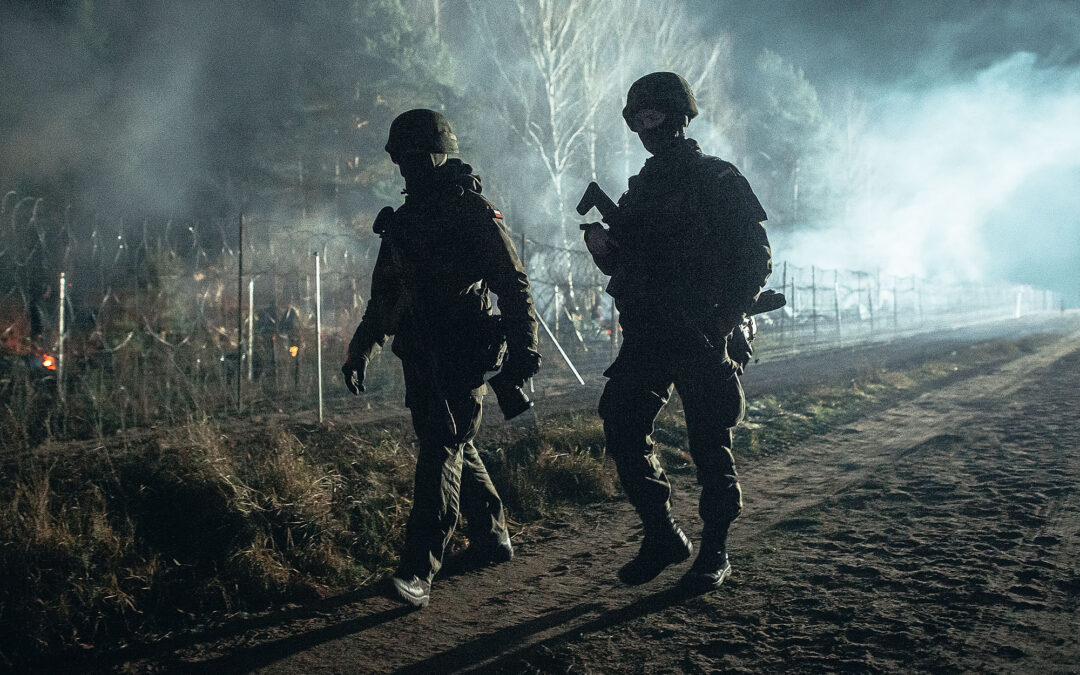Poland’s defence minister says he has “awarded” soldiers who are accused of attacking three journalists near the border with Belarus. A Polish army general has also defended their actions, insisting that no violence or insults were used.
Their announcements came as a new recording of the incident emerged, further revealing offensive language used by the soldiers – including a racist term – and also how they discussed destroying and stealing the reporters’ equipment, as well as wiping their fingerprints off it.
“Imagine that we are in the middle of a hybrid attack – Poland has been attacked,” Mariusz Błaszczak, the defence minister, said in an interview with RMF FM, referring to the crisis at the border with Belarus.
And in the midst of this, “three people masked and hooded are sneaking around…a military camp”, he added, in reference to the reporters’ behaviour. The soldiers upheld their duty to “ensure security” by confronting them, he said.
“They have to react firmly and they did so,” Błaszczak argued. “They received an award from me. In the sense that I praised their conduct.”
Błaszczak chwali żołnierzy, którzy zatrzymali fotoreporterów. "Dostali ode mnie nagrodę" https://t.co/9Qk3yZ0cnp pic.twitter.com/o7r6p4edub
— Radio TOK FM (@Radio_TOK_FM) November 20, 2021
The minister has previously accused the reporters of “acting irresponsibly”. An official statement from his department called the soldiers’ intervention – which took place in an area outside the border emergency zone that journalists are banned from entering – “fully justified”.
Meanwhile, General Tomasz Piotrowski, who is operational commander of the Polish armed forces, told a press conference that “no one hit anyone, no one insulted anyone, no one tugged anyone”, reports TVN24.
Piotrowski claimed that the journalists carried no identification and were difficult to understand while speaking through masks. “Anyone can say that they are journalists,” he said, adding that “it turned out that they were not shaved, which in a situation of limited visibility can be interpreted in various ways”.
The three photojournalists, who represented different international organisations, claim that they were “attacked” by a group of men wearing Polish army uniforms, handcuffed, and searched for an hour, despite identifying themselves as journalists.
Having been documenting the military presence near the village of Wiejki, they say they were ordered out of their car and had the personal messages on their phones and the memory on their cameras checked.
One of them, Maciej Nabrdalik of the New York Times, called the soldiers “thugs in uniforms” and said that “with every single action, they broke the law”. He also accused the defence ministry of releasing a statement about the incident that was “full of lies”.
“In [Poland], there is no ban on documenting military camps or soldiers outside of the emergency zone,” said another journalist from the group, Maciej Moskwa, speaking to OKO.press.
„Oświadczenie MON jest pełne kłamstw. Służby mundurowe lubią utożsamiać się z honorem. Teraz widzę jak to działa w praktyce”, mówi @RadioZET_NEWS zatrzymany fotoreporter Maciej Nabrdalik. „Uprzedziliśmy wartownika, że będziemy robić zdjęcia. A maski mieliśmy, bo trwa pandemia” pic.twitter.com/7A6oXHVB16
— Maciej Bąk (@MaciejBk1) November 17, 2021
A new recording has also now emerged revealing attempts to intimidate the journalists. “Keep your hands up. Maybe this will f****** put you off taking more photos!” the soldiers are heard to say. Then: “I am counting on some atmosphere that will discourage them. As I have already discouraged them a bit.”
In the audio clip – which has been published by TVN24 and OKO.press – the soldiers are heard to be discussing the value of the equipment of the reporters and how it should be destroyed or stolen.
“Now you have to take this camera home. You have to destroy it, you have to make a fire,” one soldier said. “My wife said recently that she would like one. Maybe she would start taking photos,” another one responds. “I want this one,” says another one.
„Wszędzie nasze odciski zostawiamy”. Żołnierze atakując dziennikarzy wiedzieli, że łamią prawo.
– Musisz go [aparat] zniszczyć, ognisko musi być.
– A żona ostatnio mówiła, że by chciała. Może by zdjęcia zaczęła robić?
– No właśnie, ja ten chcę. Ten o.https://t.co/koEUgfOWdQ— Aneta ObserwatorXY (@ObserwatorXY) November 20, 2021
The soldiers are also heard talking about not wearing gloves while searching the equipment and thus leaving their fingerprints all over them. One of the soldiers orders another to wipe them clean.
“We’re unlucky that we’re out outside of the f****** emergency zone,” they comment. Looking through the photos they are heard to say: “If they have photos from the border, they must have been in the zone.”
Commenting on photographs of migrants, one soldier then uses an offensive term – “ciapaty” (meaning “chapati”) – to refer to people from Asia and the Middle East.
Zatrzymania dziennikarzy poza obszarem stanu wyjątkowego. Żołnierze mieli sprawdzać zdjęcia w aparatach fotoreporterów, mimo że jest to niezgodne z prawem i żołnierze mieli mieć tego świadomość. Minister obrony narodowej chwali jednak działania żołnierzy.
https://t.co/DmWQY6kqfp— Antoni Graniszewski (@graniszewski) November 22, 2021
Main image credit: Irek Dorozanski / DWOT (under CC BY-NC-ND 2.0)

Agnieszka Wądołowska is deputy editor-in-chief of Notes from Poland. She is a member of the European Press Prize’s preparatory committee. She was 2022 Fellow at the Entrepreneurial Journalism Creators Program at City University of New York. In 2024, she graduated from the Advanced Leadership Programme for Top Talents at the Center for Leadership. She has previously contributed to Gazeta Wyborcza, Wysokie Obcasy and Duży Format.




















